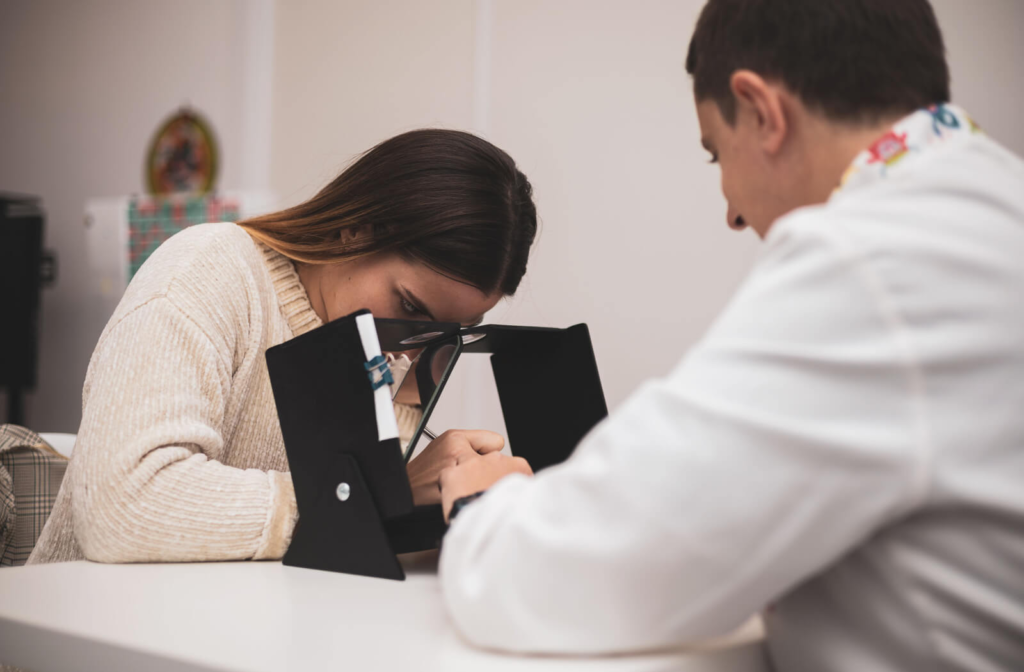You may be skeptical about the effectiveness of vision therapy and working on visual skills. How can vision therapy help treat serious ocular problems like amblyopia, strabismus, or convergence insufficiency? Does vision therapy work?
Vision therapy can dramatically improve visual skills and your quality of life, but you need to follow your treatment plan to achieve maximum results. Your eye care team can develop a customized treatment plan designed specifically for your vision needs and goals to help boost your academic performance, professional life, improve your sports skills, or enhance your creative hobbies.
What Is Vision Therapy?
Vision therapy is a non-surgical, noninvasive, and drug-free treatment that aims to improve visual skills. Through a series of exercises and activities, the brain and eyes are retrained to work together more effectively.
Using tools such as specialty lenses, prisms, filters, and other devices, vision therapy can help develop new neural pathways through neuroplasticity to enhance information processing in the visual system.
What Visual Skills Can Vision Therapy Work On?
Good visual function relies on several skills that you use to read, play sports, drive, or perform professionally and academically. Virtually every area of your life benefits from a solid foundation of visual skills to fulfill your daily activities.
While your vision therapy treatments won’t focus on every visual skill, your eye care team can develop a treatment plan to target specific skills where improvement may dramatically impact your life.
Some of the primary visual skills include:
- Eye movement control: the ability to focus the movement of both eyes using the 6 eye muscles
- Binocular coordination: the ability to synchronize the eyes in the same direction, at the same level of strength
- Convergence: the ability of the eyes to turn inward together as an object moves closer to the face
- Accommodation flexibility: where the eyes can consistently change focus between objects at various distances
- Visual memory: the capability to remember words or images as they’ve been seen before
- Visual thinking: also referred to as picture thinking, this is the ability to think and analyze what you’re seeing
- Depth perception: the ability to tell whether objects are near or far in relation to other objects
- Visual motor skills: the ability to move through spaces using visual information without bumping into anything and the ability to perform close-up activities with accuracy
- Visual perception: awareness of your environment
- Visual integration: the ability to use your vision along with the other senses for complex tasks

Who Can Benefit from Vision Therapy?
Vision therapy can benefit several eye conditions, along with other seemingly unrelated conditions, including:
- Amblyopia (lazy eye)
- Strabismus (crossed eyes)
- Brain injury, concussion, and stroke rehabilitation
- Convergence insufficiency
- Binocular vision problems
- Dyslexia
- ADHD
- Problems in sports
It’s not uncommon for behavioral or learning problems to be treated medically when they can actually be vision problems.
Talk to your optometrist about your child’s school performance, attention issues, and eye complaints to give your optometry team a comprehensive understanding of your child’s vision struggles.
How to Determine if You Need Vision Therapy
Kids’ behavior can often indicate vision issues that vision therapy may help resolve. Some of these behaviors include:
- Mixing up similar words
- Reading below grade level
- Confusing letters like b, d, p, and q
- Skipping words or lines when reading
- Frequent eye rubbing
- Difficulty with reading comprehension
- Avoiding homework or studying
- Poor attention span
- Inability to sit still and focus
- Write numbers backward
In adults, you may benefit from vision therapy if you:
- Squint or tilt your head
- Experience dizziness
- Have double vision
- Get migraines or headaches
- Develop eye strain during close-work tasks
- Experience eye fatigue
- Use a ruler to keep track of lines when reading
- Have adult amblyopia or strabismus
Will Vision Therapy Work for You?
If you’ve ever had a bodily injury or surgery and needed physical therapy, you’re familiar with the work you had to do outside of the treatment room to rehabilitate yourself—exercises you had to do, workouts you needed to avoid, lifestyle changes, and frequent monitoring of your healing. Without following this kind of treatment plan, you may not heal as quickly or effectively.
Vision therapy is similar to physical therapy in that you have to do the exercises and activities as your vision therapist lays out in the treatment plan to optimize your results. Skipping the laid-out plans can seem harmless, but it can disrupt your treatment, slow your results, and feel frustrating.
Your vision therapist can design a realistic treatment plan for your lifestyle to limit setbacks while still producing results to improve your visual skills.
Get a Personalized Treatment Plan
Since your eyes, visual skill limitations, and treatment preferences are unique to you, we can develop a treatment plan to reflect that. At Total Vision Rancho Bernardo, your vision therapist can tailor activities and exercises and select tools and techniques for your specific visual needs and goals.
Schedule an appointment with the Total Vision Rancho Bernardo team for a comprehensive eye exam to identify ocular issues and find out if you can benefit from vision therapy.



